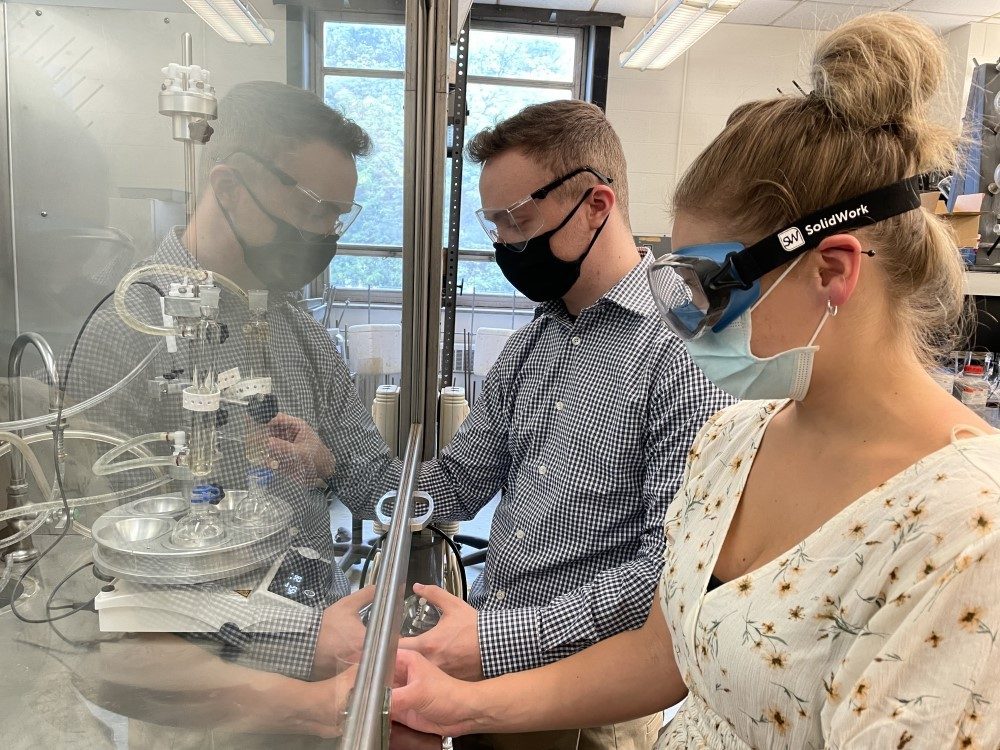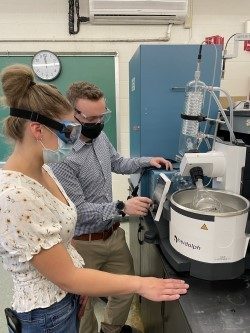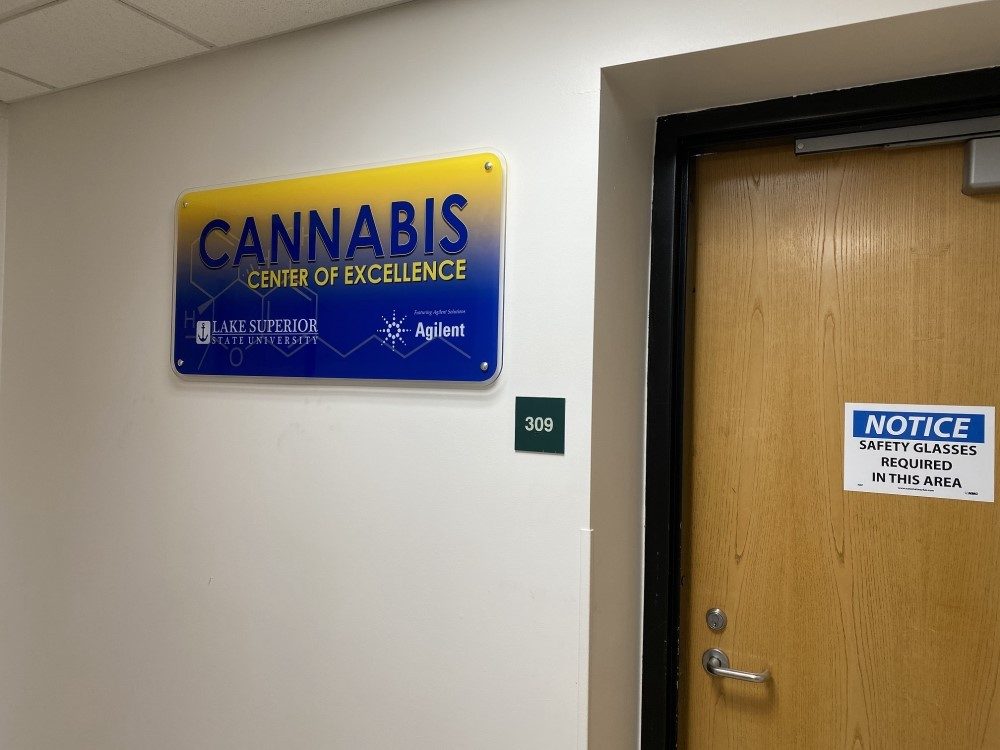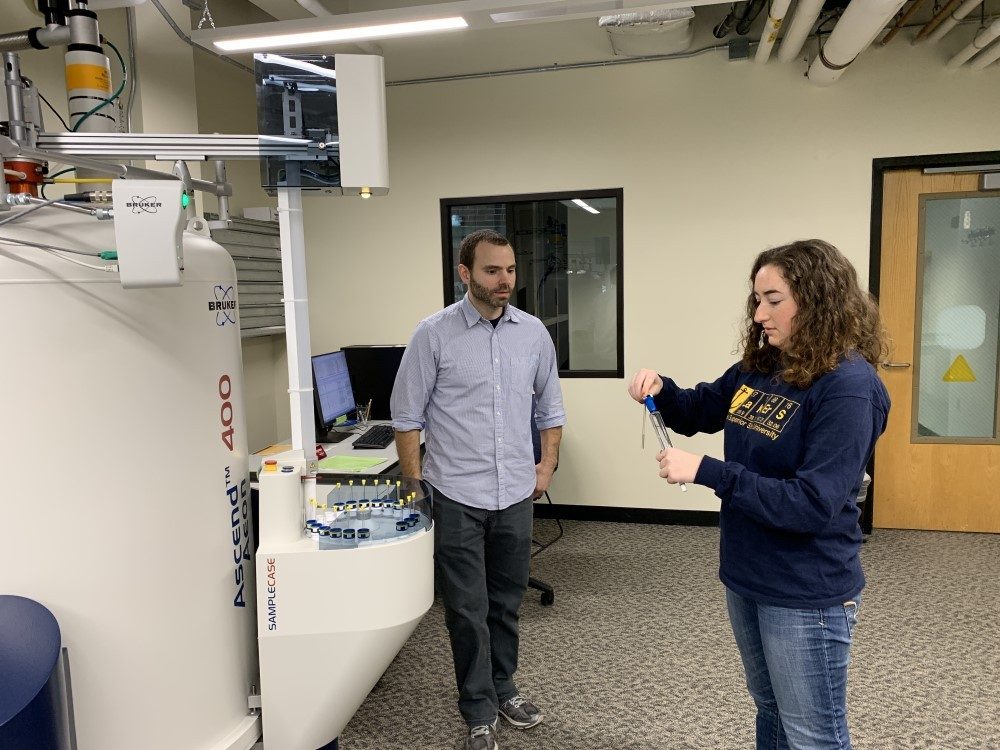Institutional Highlights
Keeping Chemistry Aligned with Today's Industrial & Social Trends
By Mike May for the American Chemical Society
The expectations of chemistry departments keep changing. Advances in theory and technology drive some of those changes, and the evolution of industry and society can spawn others. Here, we’ll explore two American Chemical Society (ACS)-approved programs at the forefront of keeping chemistry education current.
Training students for teamwork
About an hour east of Pittsburgh lies Indiana, Pennsylvania—the hometown of Academy-Award winner Jimmy Stewart and the location of Indiana University of Pennsylvania (IUP). In 1951, when IUP was still known as the Indiana State Teachers College, Stewart played a scientist in No Highway in the Sky, in a way foreshadowing the strong growth ahead for IUP in science.
Some of the most exciting growth can be found in IUP’s ACS-approved chemistry department. When asked what makes this department stand out, Justin Fair, Ph.D., professor of chemistry and assistant chair of the department, says, “We really focus on hands-on laboratory training.” He adds, “We have a lot of collaboration—not just within the department, but between departments—like a project where we’re trying to create neurotransmitters to treat cocaine or methamphetamine addiction.” These projects give students an opportunity to work together on real research.
Working as a team might matter even more than some chemists think. Anne Kondo, Ph.D., professor of chemistry and chair of the department, and Fair surveyed employers about what skills they wanted in chemists. “They need students who know how to work in teams, who can give and receive constructive criticism and who see improving the team as part of their job,” Kondo says. Perhaps surprisingly, the surveyed employers ranked these skills over a student’s GPA or technical skills.
To accommodate such employer interests, IUP offers a professional teamwork and leadership minor, which Fair leads. The key here, Fair explains, “is that we don’t just talk about teamwork, the students apply it—actually using those skills and providing feedback to each other so it’s much more of a skill-based minor versus a theory-based minor.”
Rather than relying on chemistry faculty, who indicate they already have enough content to cover, the minor connects foundational topics covered in required general education courses—such as, communications, theater, philosophy, psychology and sociology—to teach teamwork skills. Later, the students apply what they’ve learned by practicing and reflecting on their team skills during in-major, teamwork intensive courses, such as analytical chemistry.
In IUP’s chemistry training in general, the faculty focuses on getting students involved in working together in research. “We encourage students to get involved in research as soon as they feel comfortable,” Kondo explains. “In that research, we are also trying to teach these interdisciplinary skills and personal skills that are an important part of their research—all while polishing the human side of working with other people.”
The ACS-approval also supports this chemistry department’s efforts to provide students with more resources. “It has helped us, for example, to maintain library collections and apply for funds to get instrumentation,” Kondo says. She also makes sure to submit the names of students for their free ACS membership, which “is probably the first time they realize all the resources that are there to help them plan for graduate school or to be a good graduate student or how to search for work or what kind of salaries they should ask for,” Kondo says. That ACS membership, she adds, is “an excellent, excellent resource.”
In fact, Kondo and Fair see the ACS approval benefiting the chemistry students during and beyond their degree at IUP. For example, Fair says, “The ACS certification is basically a mark of excellence, an indicator of what type of students are going to be coming out of that institution.” He adds, “If I was an employer, I would hire someone with an ACS-certified degree versus one that’s not, because it’s an indicator of what they had access to, like an NMR, and the opportunities that come along with it.”
The chemistry of cannabis
In 2008, Michigan legalized the therapeutic use of cannabis, with recreational use legalized in 2018. At Lake Superior State University (LSSU) in Sault Ste. Marie, Michigan, students can study the chemistry of cannabis.
“Anticipating a need for skilled chemists for the burgeoning cannabis industry across the U.S., we began to work on cannabis degrees in the fall of 2018,” says Steven Johnson, Ph.D., dean of the College of Science and the Environment at LSSU. “Faculty within our School of Science and Medicine developed the initial framework.” In the spring of 2019, LSSU formed a cannabis-chemistry advisory board that includes members from production (Classic Roots Farm, Kalkaska, MI), processing (Cannalicious Labs, Pinconning, MI), compliance (Cambium Analytica, Traverse City, MI) and other topics. “Their input was invaluable to structure the degree and courses to insure our graduates would have the appropriate skill sets—not only as chemists, but also as pioneers in cannabis chemistry,” Johnson says.
More than just offering courses in cannabis chemistry, LSSU developed a program of options. “We currently offer two cannabis chemistry degrees and a certificate,” says Johnson. “We have developed a bachelor’s degree in cannabis chemistry, in addition to an associate degree in cannabis science and a cannabis production certificate.”
The students in the bachelor’s program study a wide range of chemistries, including general, organic and analytical chemistry. This provides “a solid foundation for a number of cannabis-focused courses, including cannabis plant sample preparation, cannabis production and cannabis separations chemistry,” Johnson says. “Those opting for the ACS-certified cannabis chemistry degree take additional courses in physical chemistry and inorganic chemistry, and complete a lab-based senior research project.”
LSSU already had ACS-approved degrees in chemistry, biochemistry and forensic chemistry. “Faculty, students and parents alike understand the benefits and level of education associated with this,” Johnson explains. “The LSSU cannabis chemistry degree was the first in the country to focus on cannabis.” In addition to LSSU’s multimillion-dollar analytical cannabis laboratory, Johnson says that ACS-approved programs come with many benefits to students: “The department guarantees a level of rigor and a broad base of chemistry knowledge and skills, in which students complete more than 400 hours of laboratory time and, typically, a novel research experience.”
As Johnson indicates, LSSU students interested in the chemistry of cannabis can choose from various approaches. As an example, he notes, “The cannabis production certificate is unique in that all coursework is online, with the exception of a weeklong lab residency to complete the program.”
No matter what path an LSSU student takes to learning more about cannabis, Johnson points out that they all “complete lab work in our Cannabis Center of Excellence featuring Agilent Technology, which houses our analytical cannabis laboratory and production and processing facility.”
Beyond all of the course and laboratory opportunities in cannabis chemistry at LSSU, the university is expanding the financial resources for students. “Lake Superior State University is the first accredited university to offer a cannabis-specific scholarship,” says Johnson. “The first-of-its-kind scholarship—sponsored by Steadfast Labs in Hazel Park, Michigan—will be awarded this fall.” Plus, Wheelhouse Cannabis Company in DeTour, Michigan recently set up the first endowed cannabis-chemistry scholarship. “Response has been overwhelming, as LSSU has many first-generation-in-college, economically disadvantaged students,” Johnson says.
Already, graduates of cannabis programs at LSSU have found jobs in various areas, including cannabis-compliance facilities and consumer health and safety. “Some elect to pursue an entrepreneurial route, not only in Michigan but also beyond,” Johnson says. “Others seek employment in extraction and processing facilities.” He adds that LSSU graduates in cannabis chemistry “are highly sought after by our industry partners, as their hands-on training—specific to the cannabis sector—puts them ahead of their peers.”
“They [industry] need students who know how to work in teams, who can give and receive constructive criticism and who see improving the team as part of their job” - Anne Kondo, Ph.D., IUP
Chemistry Students and Faculty at Indiana University of Pennsylvania
“Faculty, students and parents alike understand the benefits and level of education associated with this [ACS Approval],” - Steven Johnson, Ph.D., LSSU
Chemistry Students and Faculty at Lake Superior State University





